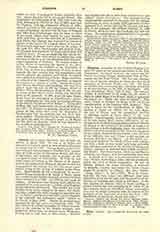

Cleophas, according to the Catholic English versions the name of two persons mentioned in the New Testament. In Greek, however, the names are different, one being Cleopas, abbreviated form of Cleopatros, and the other Clopas. The first one, Cleopas, was one of the two disciples to whom the risen Lord appeared at Emmaus (Luke, xxiv, 18). We have no reliable data concerning him; his name is entered in the martyrology on the 25th of September. (See Acta Sanctorum, September, VII, 5 sqq.) The second, Clopas, is mentioned in St. John, xix, 25, where a Mary is called Mapta roO KXwlra, which is generally translated by “Mary the wife of Clopas”. This name, Clopas, is thought by many to be the Greek transliteration of the Aramaic ‘tr1, Alphus. This view is based on the identification of Mary, the mother of James etc. (Mark, xv, 40) with Mary, the wife of Clopas, and the consequent identity of Alphwus, father of James (Mark, iii, 18), with Clopas. Etymologically, however, the identification of the two names offers serious difficulties: (I) Although the letter Heth is occasionally rendered in Greek by Kappa at the end and in the middle of words, it is very seldom so in the beginning, where the aspirate is better protected; examples of this, however, are given by Levy (Sem. Fremdworter in Griech.); but (2) even if this difficulty was met, Clopas would suppose an Aramaic Halophai, not Halpai. (3) The Syriac versions have rendered the Greek Clopas with a Qoph, not with a Ijeth, as they would have done naturally had they been conscious of the identity of Clopas and Halpai; Alphieus is rendered with a Heth (occasionally Aleph). For these reasons, others see in Clopas a substitute for Cleopas, with the contraction of co into w. In Greek, it is true, co is not contracted into w, but a Semite, borrowing a name, did not necessarily follow the rules of Greek contraction. In fact, in Mishnic Hebrew the name Cleopatra is rendered by s!t’1t i p, Clopatra, and hence the Greek Cleopas might be rendered by Clopas. See also, Chabot, “Journ. Asiat.”, X, 327 (1897). Even if, etymologically, the two names are different they may have been borne by one man, and the question of the identity of Alphieus and Clopas is still open. If the two persons are distinct, then we know nothing of Clopas beyond the fact recorded in St. John; if, on the contrary, they are identified, Clopas’ personality is or may be closely connected with the history of the brethren of the Lord and of James the Less. (See Brethren of the Lord; James the Less).

